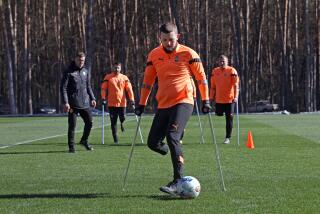For Touring Soviet Hockey Teams, the Times Are Definitely Changing
- Share via
UNIONDALE, N.Y. — Glasnost and familiarity have created considerable change for touring Soviet hockey teams and North Americans with whom they come into contact.
During previous visits, players were closely watched by grim-faced “tour guides” and media interviews were rigidly conducted with interpreters who obviously altered any controversial words.
Now it is possible for a player such as Viacheslav Fetisov to express in a 40-minute news conference his dissatisfaction with both Coach Viktor Tikhonov and the Soviet Defense Ministry, a phenomenon that Fetisov admitted, “If it weren’t for (Mikhail) Gorbachev, this would be impossible.”
The police still are out in force to assure that Soviet players will be protected from dissidents who object to their coming here. For Thursday’s game here, there was a mobile command post, at least two dozen vehicles and half a dozen police on horseback. But there were no dissidents.
There were precious few spectators, either, a mere 9,504 in a building that seats 16,297. The turnout prompted Islander General Manager Bill Torrey to wonder what will happen next year, when the Soviets are scheduled to play all three New York-area teams.
“There’s a large segment of my customers who don’t want this game played,” Torrey said. “People are telling me, ‘We don’t want the Russians here.’ If we don’t sell out and the Devils don’t sell out, how can we sell three games next year?”
Some of the Islanders’ veterans, notably Bryan Trottier, who didn’t play, and Bill Smith, who played under protest, felt the game was unnecessary, Smith complaining, “I’ve got nothing to gain, except maybe getting hurt.”
But some of the younger players tried very hard and Patrick Flatley said, “When nationalism is at stake, you develop a distaste for other countries. When you play against them, you can’t help but dislike them. It goes back to the (1984) Olympics.”
There was a feeling that the Soviets themselves were more interested in a shopping visit to Crazy Eddie’s than in the game itself.
Asked how well the Central Red Army had played after it edged the Islanders, 3-2, winger Vladimir Krutov replied through an interpreter, “A victory is a victory.”
Asked if his team was excited about the game, Tikhonov sidestepped, “Our better game is ahead. We need time to adapt ourselves to North American playing. The time difference is eight hours between Moscow and North America.”
Meanwhile, center Igor Larionov, who speaks fluent English, sat and feigned laughter as the questions were presented to Tikhonov, winking at a reporter and obviously enjoying himself.
After Tikhonov’s segment ended, he left the interview room and Krutov and Larionov were put on the North American media hot seat.
Larionov, who has been drafted by Vancouver and has made known his desire to play in the NHL, said, “It’s always important for me to play in North America. I like the ambiance, the atmosphere here. I feel the spectators very much like hockey in these countries and it’s important for both parties to come together.”
A reporter then asked Larionov about a letter he wrote to the magazine Ogonyok, protesting Tikhonov’s oppressive training methods as well as his coaching tactics.
Larionov covered his face and said, “Oh, no,” but the interpreter obviously was unaware of the letter and translated the question for Krutov, who shrugged his shoulders. The interpreter then said, “What letter?” and the reporter began a recital, while Larionov struggled to keep a straight face.
After discussing the players’ enforced absence from their wives, the reporter went on to mention a statement that the players often ignored Tikhonov and made up their own plays, at which point Larionov shouted in English, “Too much, too much.”
The mere thought of players criticizing the coach would have been unthinkable in the past, when players were reluctant to say more than “Hello” to the natives. But Gorbachev obviously has lightened the atmosphere.
Fetisov, in two earlier interviews, accused Tikhonov of placing obstacles in his attempt to join the New Jersey Devils. Tikhonov, who recently passed the captain’s “K” from Fetisov to Sergei Makarov, insisted he had approved Fetisov’s release in May, “but there are other top-level officials,” an apparent reference to Defense Minister Dmitri Yazov.
However, Fetisov, a major in the Red Army, said, “If Tikhonov wanted it, I think this thing would be resolved quickly. He’s all talk and no action.”
That statement was made through a translator. In English, Fetisov said of Tikhonov, “He’s an actor, a very good actor.”
Besides the atmosphere, the Soviets’ game appears to have changed, too. Instead of passing the puck patiently until they set up a good shot, as they once did with such grace, they are following the typical NHL practice of shooting from all angles. Against the Islanders, the Soviets put 37 shots on goal and fired countless others wide. But they were low-quality shots; all three goals came on breakaways.
For each of the 14 games being played here by the Army and Dynamo Riga, the Soviets are guaranteed a fixed amount, believed to be $25,000. They also receive a percentage of the gate, expenses and a full set of equipment.
Accordingly, the Army appeared in its opening match at Quebec in spiffy red helmets and sweaters. However, the players wore blue pants borrowed from the Nordiques, because their new red ones had been shipped inadvertently to Moscow. Also, the sweaters lacked names on the back, because the manufacturer mistakenly put the Army players’ names on the Dynamo sweaters. The mistakes were rectified for the game here.
If some fans are indifferent, it would appear nonetheless that matches against the Soviets will increase and a lot of people on both sides think it is a good thing.
Coach Al Arbour of the Islanders said, “It’s a good experience for a great number of our players. We can learn from them and they can learn from us. Their skating and headmanning the puck are things we’ve got to do.”
Krutov said, “Any games with North American teams are prestigious. It’s very good for our hockey future to play them.”
Now if Fetisov and Larionov could only figure out their hockey future.
More to Read
Sign up for Essential California
The most important California stories and recommendations in your inbox every morning.
You may occasionally receive promotional content from the Los Angeles Times.













